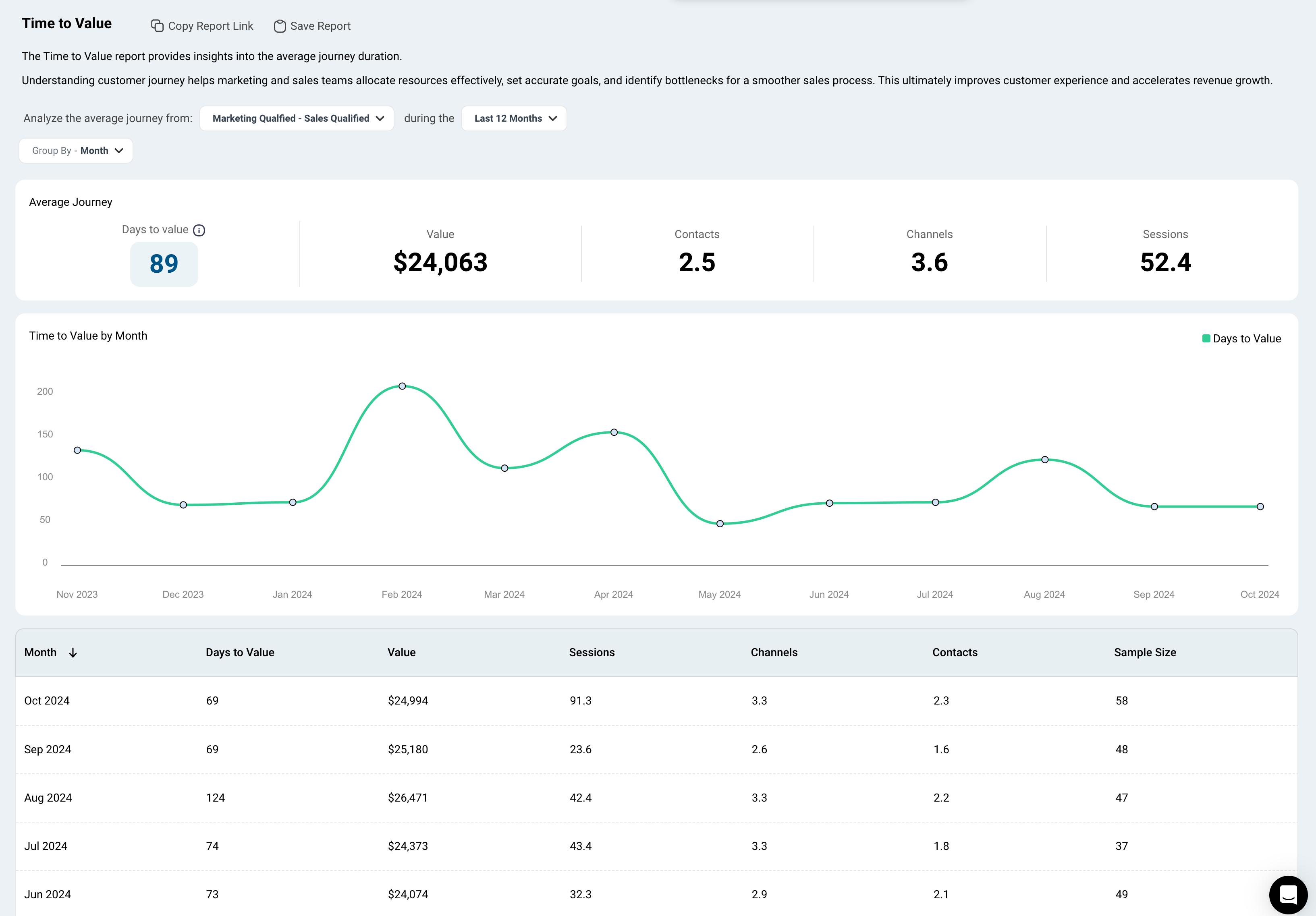Time to Value Report
Unlocking Pipeline Insights with Dreamdata’s Time to Value Report
For marketing and sales teams, understanding the key and common factors that drive pipeline efficiency is crucial for long-term success.
Dreamdata’s Time to Value Report provides powerful insights into the pipeline process, helping marketing and sales teams allocate resources effectively, set accurate goals, and identify bottlenecks for a smoother sales process. This ultimately improves team collaboration, customer experience and accelerating revenue growth.
..
.
The report focuses on two critical stages of the customer journey: from Marketing Qualified to Sales Qualified, and from Sales Qualified to Closed Won. By breaking down the customer journey into these sections, you gain a clearer picture of the time and effort involved at each stage, allowing you to optimize your strategies.
Key Metrics You’ll Gain from the Time to Value Report
- Typical Journey Length in Days: How long does it take to close a deal? Knowing the average time from MQL to SQL, and SQL to Closed Won, lets you set realistic targets and identify bottlenecks in your process.
- Number of Sessions, Channels, and Contacts: Get a comprehensive view of the complexity of a typical deal. How many interactions with potential customers are required? How many channels and contacts are involved? These insights help you streamline your engagement strategies and improve sales efficiency.
Track Your Journey Over Time
The report aggregates data monthly, allowing you to track your pipeline process over time. Is your average journey length decreasing as your team becomes more efficient? Are deals closing faster in one region or industry than another? With this report, you can assess trends and make adjustments as needed.
Rich Data for In-Depth Analysis
The ability to break down data by country, employee size, or industry opens the door for meaningful performance comparisons. By grouping metrics this way, you can better understand how different segments of your business are performing and where you might need to make improvements.
Dreamdata’s Time to Value report isn’t just about tracking performance—it’s about uncovering insights that help you take control of your pipeline and accelerate your time to revenue. Start using this report today to sharpen your focus and drive better business outcomes.
.
How can you use the Time to Value report
Understanding the length of the typical customer journey is crucial for marketing and sales teams because it directly impacts the effectiveness and efficiency of their strategies. Here are several key reasons why this knowledge is so important:
- Better Resource Allocation
When teams know how long it typically takes to convert a lead into a customer, they can better allocate resources like time, budget, and personnel. They can identify which stages of the journey require more attention and optimize efforts to support leads through the funnel more effectively. - Improved Forecasting and Goal Setting
Accurately understanding journey length allows teams to predict revenue more reliably. Marketing and sales teams can set more realistic goals and timelines, ensuring that they meet quarterly or annual targets. This helps in avoiding last-minute rushes to close deals at the end of a quarter and allows for smoother, more predictable growth. - Enhanced Customer Experience
- Identifying Bottlenecks
Knowing the time it takes to move from one stage to the next—such as from Marketing Qualified Lead (MQL) to Sales Qualified Lead (SQL)—helps teams pinpoint where delays occur. This insight allows them to address inefficiencies, remove friction, and improve processes, leading to a faster and smoother sales cycle. - Strategic Campaign Planning
Marketing teams can design campaigns that align with the customer journey timeline. For instance, if they know a lead conversion usually takes 30 days, they can plan follow-up emails, retargeting ads, or nurturing content to keep potential buyers engaged throughout the entire process. - Alignment between Marketing and Sales
When both teams have a clear understanding of the customer journey length, it fosters better alignment and collaboration. Sales teams can offer input on the quality and timing of leads, while marketing teams can adjust their strategies to generate higher-quality leads more aligned with the expected sales cycle. - Revenue Accelleration
The ultimate goal of understanding the customer journey is to identify ways to shorten it without compromising lead quality. By analyzing journey length data, marketing and sales teams can implement changes that result in faster conversions and quicker revenue generation.
In summary, understanding how long the customer journey takes helps marketing and sales teams optimize their efforts, improve the buyer experience, and ultimately drive faster, more predictable growth.
